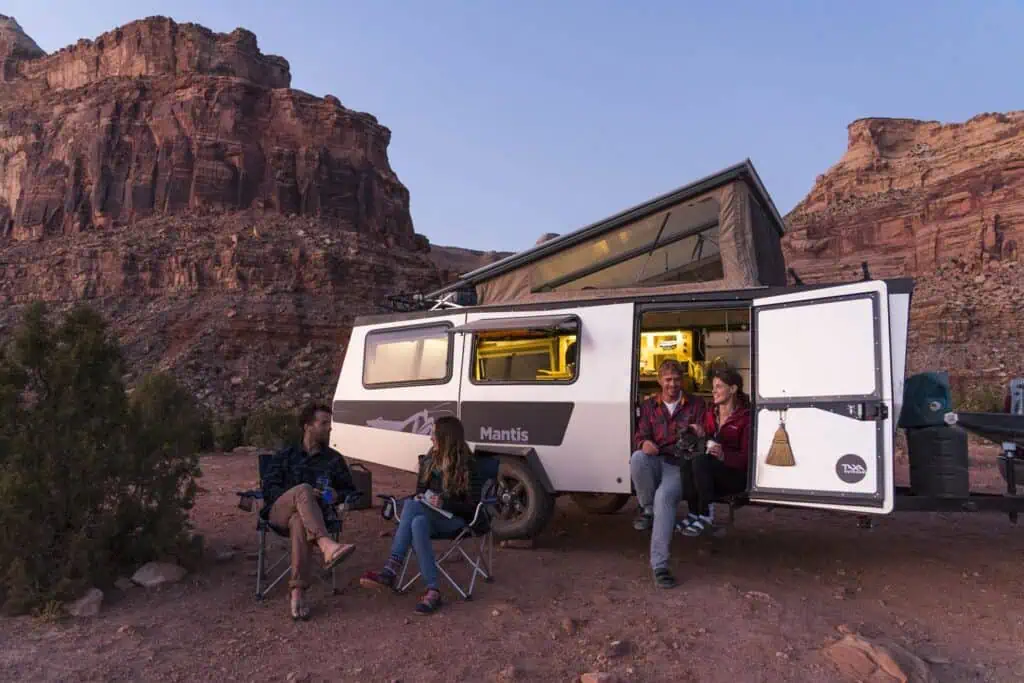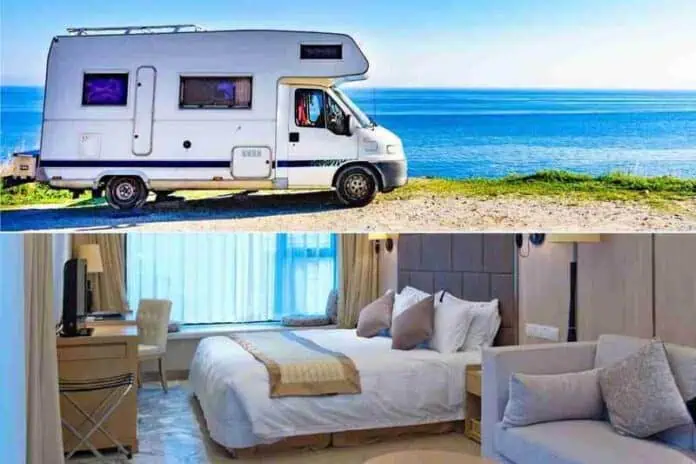We all know just how much waste we produce and how much energy we use, we can even see it in our household bills. Most people have busy jobs and/or children to care for, which can make it difficult to make time to examine where they can lower their environmental footprint. For those who want to take the plunge and learn about their environmental impact on our Earth, vacations are a great place to start looking at where to cut back. The difference between an RV environmental impact vs. a hotel stay might be that a responsible vacationer opts for the RV.
Life is busy, and everyday essentials like groceries and work equipment are tough to alter or change to fit a more environmentally conscious lifestyle. Vacations, on the other hand, can be altered much easier and have many more options for environmental consumers. A great way to see where you can cut back to make smart environmental choices is to compare a traditional vacation to a more environmentally conscious option like RV camping. Here, we will take a look at both hotel stay carbon footprint and RV environmental impacts and see how they relate.
Hotel Vacations
Hotel vacations are designed to feel like a dreamy wonderland: endlessly convenient, comfortable, and luxurious. While these things are great to experience every so often, they also leave a huge carbon footprint. Most people start a vacation with a flight, to get to a fancy location that feels new and exciting.
Don’t we all love exploring new places? However, flights emit huge amounts of CO2 into the atmosphere, which immediately starts a huge environmental footprint for a weekly vacation. Cross-country flights can emit up to 2 tonnes of CO2 per person, and flights across the ocean can emit up to 7 tonnes.
Next is the issue of the hotels themselves. Hotels are famously convenient and are well known for having just about everything you could possibly need while you are away from home. The downside is the amount of waste this creates. Hotels often use disposable plastic items such as combs, cups, bags, toothbrushes, water bottles, and so on.
Hotel amenities left in your room, whether used or not, often end up in the trash since they can’t be given to the next guest. The same thing happens with hotel foods. While the complimentary breakfast is a great addition to the trip, any food that is not eaten by the guests each morning is disposed of. This leaves heaps of waste from each guest. Now, just imagine how much waste that creates for the whole building each day!
Hotels also pose an issue in terms of energy consumption. Since guests are there 24/7 and safety is their utmost concern, energy is always being used in hallways and public spaces. Lights are an important part of safety. The same is said for heating and cooling. In order to make sure the building is as comfortable as possible, one of the two is always at work. All of these things mentioned leave hotel vacation guests with a huge environmental footprint, all because of where they choose to stay.
RV Environmental Impact – Camping Vacations

RV camping vacations are a great alternative to hotel vacations, as they provide much of the comfort and luxury with a significantly reduced RV environmental impact and footprint. While they certainly do not eliminate environmental footprints completely, they can be a great and simple start to a family’s environmental conservation journey.
The start of an RV camping vacation is certainly the most environmentally costly of the whole trip. It does often require a lengthy trip to your destination of choice. However, there are ways to help with your CO2 output or sustainability. Make infrequent stops in order to conserve your gas for driving, and look into helpful items like solar panels. Adding solar panels to your RV camping gear list can help power your RV electrical products, therefore taking some strain off the battery and allowing the vehicle to run smoother. Also, be mindful of what you bring with you on your trips. Cutting down on some weight also allows the vehicle to consume gas more efficiently and lowers your RV environmental impact.
The best way to lower your environmental footprint on an RV camping trip is to choose a great campground. These campgrounds often have great amenities that allow you to camp in style and luxury. If you choose an RV campsite that has service hookups, you can use the electricity on site. Use this wisely and only when you have to.
If using your solar panels, use their power before choosing to use the campground’s electricity. You can also bring along solar-powered lanterns and lights, which are great for around your RV. The amenities within the campground are often powered by solar technology or are installed on a timed system to prevent unnecessary usage. Be sure to look into environmentally friendly soaps and biodegradable necessities to also help your environmental mindfulness.
During your RV camping trip, be sure to be mindful of your food usage and waste production. Bring along reusable dishes and cutlery to prevent single-use plastics from building up. Cooking your own food, either within your RV kitchen or over the fire, is a great way to control portions and ensure little to no food waste is left behind. Lastly, be sure to dispose of your waste correctly and take advantage of RV campgrounds’ waste disposal areas.
Key Takeaways
While no vacation is going to be totally emission-free or environmentally friendly, there are certainly ways you can reduce your environmental footprint. Avoid staying in hotels that are not actively trying to reduce their footprint. Choose a vacation such as an RV camping trip and utilize environmentally friendly RV campgrounds to further minimize the RV environmental impact.
If you can’t afford an RV for your trip and need to stay in a hotel, make environmentally friendly choices by using fewer single-use plastics and using your towels more than once. If you need to fly commercially for your vacation, consider offsetting your carbon. You can do this by packing light, taking direct flights, using online boarding passes, or even purchasing carbon offsets through registered sites.
While you may think you need the comforts of home during a vacation, consider taking a tent camping trip and experiencing the outdoors in full. By choosing camping, you can lower your environmental footprint even more.
FAQs
Is living in an RV more environmentally friendly than a hotel?
Living in an RV can be more environmentally friendly than staying in a hotel, as RVs generally have smaller carbon footprints. RVs often have more efficient energy use, water conservation, and waste management systems compared to hotels.
What is the carbon footprint of an RV?
The average carbon footprint of an RV is approximately 4 tons of CO2 emissions per year.
What is the downside of living in an RV full-time?
The main downsides of living in an RV full-time are limited space, higher fuel costs, and less privacy.
What is the economic impact of RV?
The economic impact of RVs is significant. RV manufacturing, sales, and related services contribute over $114 billion annually to the US economy and support over 600,000 American jobs.












